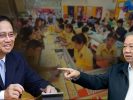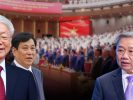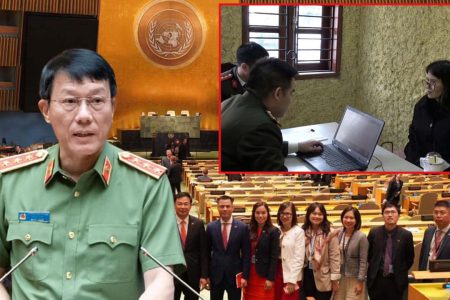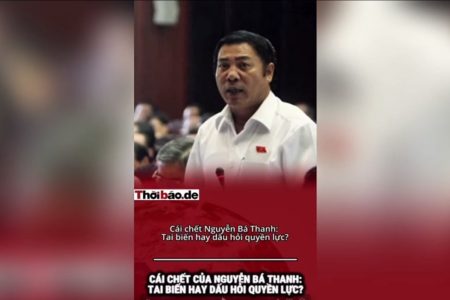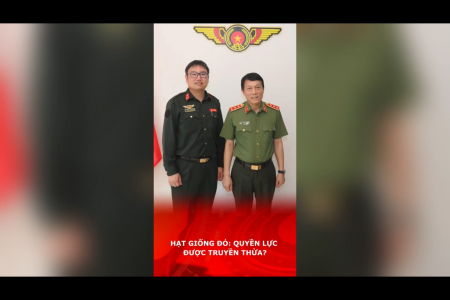
US Secretary of Finance Janet Yellen visited Vietnam for two days on July 20-21 to discuss how to solve supply chain-related problems. Yellen’s visit is a step in further concretizing the statements of the leaders of Vietnam and the United States on deepening bilateral relations, moving towards strategic cooperation, in the context that Washington wants to build a friendly relationship with Hanoi in the face of increased competition with China.
Using the economy as the driving force for the development of Vietnam-US relations
Ms. Yellen’s visit took place in the context of the US and Vietnam deepening relations. In March 2023, there was a phone call between President Joe Biden and General Secretary Nguyen Phu Trong. The latter told Mr. Biden that science, technology and economic relations must be the driving force in bilateral relations. Among other areas, the Vietnamese communist chief also proposed cooperation in the areas of bilateral and sustainable trade, new supply chains and logistics, climate change, green transition, and digital infrastructure.
In addition to the phone call between Biden and Trong, many US officials visited Vietnam, including the visit to Vietnam by Secretary of State Antony Blinken, Agriculture Secretary Tom Vilsack, Director of the US Agency for International Development (USAID) Samantha Power, as well as high-level delegations from Congress, Presidential Envoy for Climate John Kerry and CDC Director Rochelle Walensky. In addition, US Trade Representative Katherine Tai and Deputy Minister of Commerce for International Trade Marisa Lago also visited Vietnam this year.
According to a July 13 statement from the US Treasury Department, Secretary Yellen „will work towards deepening our bilateral economic relationship with Vietnam and promoting economic resilience.“
Washington regularly asserts that shifting supply chains will help the US reduce its dependence on China, its top economic counterpart. In Hanoi, during a discussion with Vietnam’s Prime Minister Pham Minh Chinh on July 20, Minister Yellen announced the promotion of one of her favorite projects called „friendshoring“ (moving production to other friendly countries).
In her speech at the Atlantic Council on April 13, 2022, Ms. Yellen described the concept of „friendsshoring„, which is: „Facilitating the supply chain of friends to a few a large number of trusted countries, so that we can safely continue to expand our market access, will reduce the risk to our economy as well as to our trusted trading partners.”
Regarding the US „friendshoring“ policy and Vietnam’s advantages, expert Bui Kien Thanh said: „At present, the cost of labor in China has increased and the US realizes that there are production chains that should not be further developed in China but in America’s friendly countries to achieve greater perfection or friendliness. Vietnam is the closest country in this policy and India has good infrastructure and human resources. Vietnam is in the most advantageous position to be able to implement this shift policy of the US for the supply chain from China.”
Chinese Obstacle
This year marks the 10th anniversary of the comprehensive partnership between the US and Vietnam. Both sides are looking to upgrade their relationship to a strategic partnership this year.
Dr. Bich Tran in a recent analysis commented: “Although a major strategic adjustment has led Vietnam to pursue a more balanced approach between the two great powers, the Southeast Asian country is still very close to China rather than the United States. Vietnam agreed to establish a comprehensive strategic partnership with China in 2008—the highest level of cooperation in Hanoi’s diplomatic arsenal. However, it took Vietnam another five years to conclude a comprehensive partnership—the lowest level—with the United States in 2013. In recent years, the United States has repeatedly urged Vietnam to upgrade its relationship with the United States to the strategic level, but Vietnamese leaders did not respond positively. Hanoi may agree to elevate its partnership with Washington later this year to celebrate the 10th anniversary of their comprehensive partnership, but it will still be one notch lower than Hanoi’s partnership with Beijing. While the title does not always reflect the content of the partnership, as political statements they at least show that Vietnam is closer to China diplomatically. Moreover, US-Vietnam trade in 2022 is $123.3 billion, still lower than China-Vietnam trade at $177.3 billion.”
Bich Tran also commented on the reasons why the latter has not upgraded the relationship: „A number of factors can explain why Vietnam has been slow in officially upgrading its relationship with the United States to a strategic partner. First, geographical proximity and a common 1,306 km border with China, which is much larger physically, economically and militarily than Vietnam, has made China became too big in the minds of Vietnamese leaders. Against the backdrop of increasingly intense strategic competition between China and the United States, Hanoi feels uncomfortable explicitly drawing closer to Washington.
Second, a strategic partnership with the United States will lead to higher expectations for human rights, which Hanoi may see as a threat to the regime’s survival. Finally, there are logistical and protocol difficulties in implementing the upgrading. The two countries discussed the official visit of their senior leaders, but it did not materialize. Some observers speculate that the US-Vietnam strategic partnership will be signed by the US President and the General Secretary of the Communist Party of Vietnam. However, the comprehensive partnership between the two countries was signed by their presidents. It would be more appropriate if President Vo Van Thuong and President Joe Biden made the upgrade. However, General Secretary Nguyen Phu Trong’s dominance in Vietnam’s political system further complicates the rituals.“
Veteran American diplomat Scot Marciel in a recent article also said: “Over the past 30 years, a pragmatic approach, common interests and sustained efforts have pushed the Vietnam-US relationship forward, leading to a partnership that benefits both countries. However, the relationship’s consistently positive trajectory has sometimes led analysts to become overly optimistic about its potential, with some suggesting that the United States may have regular access to the Cam Ranh naval base or establish an important security partnership with Vietnam. Vietnam’s reluctance to elevate the relationship to a strategic partnership will serve as a reminder that while the bilateral relationship has grown, Hanoi remains concerned about antagonizing China and wary of how Washington views its one-party system. Similarly, US concerns about Vietnam’s human rights record continue to limit the extent to which the relationship can progress. While this may disappoint some, the fact remains that the journey from old enemies to current friends is a remarkable achievement and a prime example of successful diplomacy.“
Dr. Achala Gunasekara-Rockwell, an American international relations researcher, said: “The US effort to upgrade diplomatic relations with Vietnam is facing obstacles when Vietnam is hesitant to upgrade its diplomatic relations with the US due to concerns that China might view it as a hostile move amid ongoing tensions between Beijing and Washington. Washington hopes to upgrade its relationship with Hanoi this year, ideally to coincide with the 10th anniversary of the comprehensive partnership between the two countries. Despite being Vietnam’s largest export market, the United States currently ranks as Hanoi’s third-tier diplomatic partner. The United States hopes to join the second group, which includes European countries and Japan, but Vietnamese leaders are hesitant to fear that China might see it as a hostile move amid ongoing tension between Beijing and Washington. China is Vietnam’s largest trading partner and an important source of imports for the country’s manufacturing sector.“
However, Vietnamese Ambassador to the US Nguyen Quoc Dung recently replied to the press that he wanted President Biden to visit Vietnam. President Biden recently also told the press: „I received a phone call from the head of Vietnam, very interested in meeting me when I go to the G20. He wants to elevate relations with the US to a major partner, along with Russia and China.”
This suggests that perhaps both Vietnam and the US are negotiating to upgrade their relations this year. This is something that many people not only of these two countries want, but also many people around the world will gladly welcome the relations of two countries that were once hostile but are now changing dramatically. This is very valuable in the context that the world is threatened by aggressive actions from countries like Russia and China.
Thoibao.de (Translated)

















